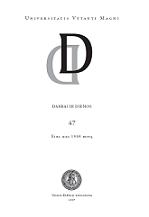Miloszas Vilniaus literatūrinėje aplinkoje
Milosz and the "Wilenskie" cultural environment
Author(s): Tadeusz BujnickiSubject(s): Language and Literature Studies
Published by: Vytauto Didžiojo Universitetas
Keywords: Milosz; Wilenskie; cultural; environment; Vilnius;
Summary/Abstract: The primary purpose of this portrait of Czesfaw Mifosz is to show the writers relationship to the liter¬ary environment of Wilno (Vilnius) during the interwar years. Statements dating from this period, as well as later ones, show a lack of enthusiasm and a tendency to perceive Wilno critically. Wilno is seen as a traditionalistic, provincial city that provoked active opposition in the writer. He searched for values and forms of expression different from those that were obligatory in Wilno. On the other hand, the cultural tradition and atmosphere of the city influenced the young writer, even when his reactions were critical. Lonely Wilno was later transformed into a personal and lasting myth. The more than ten years that Czesfaw Mifosz stayed in Wilno, from 1921 to 1937, correspond to the period of his poetic growth and initiation. At this time, regionalist writers and advocates of the romantic tradition, such as Czeslaw Jankowski, Helena Romer-Ochenkowska, Wanda Dobac-zewska, Eugenia Kobyliiiska, Jerzy Wyszomirski and others, dominate the literary scene in Wilno. The newspapers, Sfowo and Kurier Wilenski, also have considerable influence on the cultural image of the city. The "przybysze" ("immigrants")! such as fellow writer and manager of Wilnos radio station, Witold Hulewicz, and prose writer and poet, Tadeusz Lopalewski, also exercise some influence on the cultural environment of the city. Despite this, Wilno remains under the strong cultural influence of the romantic tradition and Little Poland. Mifosz, just as other young men of the same age, opposes them, first as a participant in the organization PET, later as a student of the University of Stefan Batory and member of the Academic Club of Tramps in its Original Arts division and, finally, as part of the group gathered around the magazine, Žagary, that included Teo-dor Bujnocki, Jerzy Zagorski, Aleksander Rymkiewicz and Jozef Mašlinski.. Both as a journalist (in an article on regionalism) and as a poet, with his colleagues represents the trend of the Wilno vanguard and expresses leftist opinions close to those of the group called Henryka Dembiiiskiego. His reluctance to accept the traditionalism of Wilno's literature and his liking of ethnic minori¬ties and their creative work found expression in his activities with Wilno radio, which Mifosz was forced to leave in 1937. However, as the years passed, Mitosz_perceived his Wilno period from a different perspective, more spatial than literary or cultural. He wrote in Europe in the Family that the most important part of his life elapsed in Wilno; consciousness returns, "leading one's owncities from nonentity." The poets account of the city of his youth grows more complicated over the years. Thus, turning to Tomas Venclova, Milosz absolutely affirms, "Wilno will not consent to eliminate Polish culture from its history." But is this the Wilno of Mickiewicz and the Filomates, of freemasons and rogues?
Journal: Darbai ir dienos
- Issue Year: 2006
- Issue No: 46
- Page Range: 153-165
- Page Count: 13
- Language: Lithuanian

